 Petzlover
PetzloverChart Polski is originated from Poland but Vikhan Sheepdog is originated from Pakistan. Chart Polski may grow 12 cm / 5 inches higher than Vikhan Sheepdog. Chart Polski may weigh 15 kg / 33 pounds lesser than Vikhan Sheepdog. Chart Polski may live 4 years more than Vikhan Sheepdog. Both Chart Polski and Vikhan Sheepdog has almost same litter size. Chart Polski requires Low Maintenance. But Vikhan Sheepdog requires High Maintenance
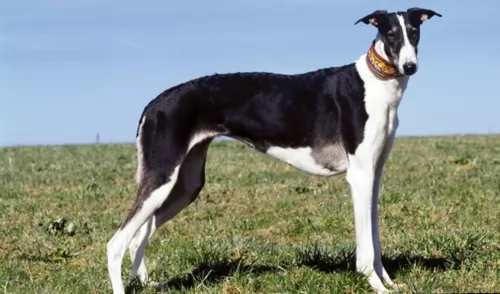 The Chart Polski dog is a member of the Greyhound family and comes from Poland. He is an old dog breed dating way back to the 1600s.
The Chart Polski dog is a member of the Greyhound family and comes from Poland. He is an old dog breed dating way back to the 1600s.
The dog also goes by other names such as the Polish Sighthound and the Polish Greyhound. The dog looks quite similar to the English Greyhound and has been used as a hunting dog. With his exceptional speed, he has been able to run down prey.
The Chart Polski has always been seen in privileged classes, and after dying out to some extent, it became popular again in the 1970s. It is looked upon as a companion dog essentially while also still being used for hunting in Poland.
Today, the Polish Kennel Club as well as the Federation Cynologique Internationale, and the United Kennel Club recognize the breed.
The Vikhan Dog is a rare breed that very little is known about. It is not sanctioned by any breed club or kennel club. The breed originally came from Pakistan in the North-west Frontier Province near the Indian border, in the Chitral region and the state of Himacchal Pradesh. For the most part Pakistan is credited with the development of the breed. They originally guarded livestock and hunting leopard. He is fast and fierce. The breed is bonded to the livestock when they are very young and instinctually guard them for the rest of their life. They do not herd them, they blend into the flock and watch for outsiders.
They confront strangers and predators with aggressive displays and vocal intimidation. If this does not work, it will attack and drive them off. They are even known for luring coyotes into a trap with food so that they can hunt them.
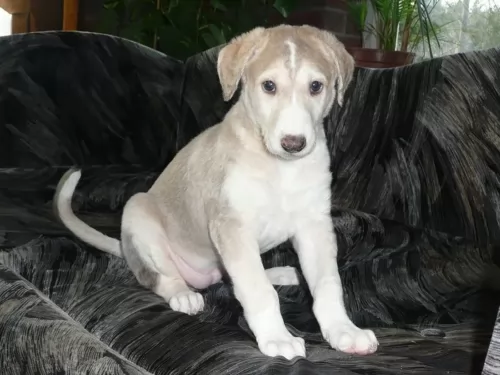 The Chart Polski looks similar to other sighthound breeds, and is a large breed, standing at between 68-80cm and weighing between 26 and 32kg. He is well muscled, slender and lean.
The Chart Polski looks similar to other sighthound breeds, and is a large breed, standing at between 68-80cm and weighing between 26 and 32kg. He is well muscled, slender and lean.
The face is typically long and narrow, although the muzzle is somewhat blunter than most sighthounds. His coat is short and sleek and can be in colors such as white, tan, black or a combination of these. His eyes are large and dark brown, the ears medium sized and narrow and usually folded back while the tail is long and curved at the tip.
The Chart Polski’s temperament is somewhat different to most sighthounds and he is thought to be more gentler and evenly tempered. He is loving and affectionate and will form a close bone with his human family.
He is confident, stubborn and strong-willed, and because he has been used for hunting, he has also got some aggressive tendencies towards other animals. He will need training and socialization to ensure he is good around other pets in the home as well as with children.
He becomes obedient and responsive with this training and socialization. He is a territorial breed, being protective around what he considers his own property and will make a good watchdog.
The Vikhan Sheepdog is a large working breed that is lean, muscular and aggressive. He is immensely intelligent and fearless. He has a thick coat in solid brown, red, fawn or black. There are also multi-colored and spotted versions as well. They are related to the other regional Molossers and are sometimes called the giant Rough Collie. They are faster than they are strong. All Molossers are solid, large and share the same ancestor.
They typically have short, muscular necks and broad but short muzzles. They have heavy bones, wrinkles and pendant ears. With well-muscled legs and wide chests, the Molossers include the mastiffs and bully breeds and all other breeds that come from those groups. Molossers are either flock guardians or home guardians. The Vikhan Sheepdog is a flock guardian
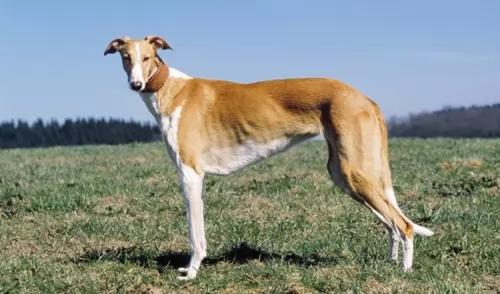 Your Chart Polski or Polish Greyhound promises to be a loving, devoted pet that fits in well to a family that will give him good exercise and look after him well.
Your Chart Polski or Polish Greyhound promises to be a loving, devoted pet that fits in well to a family that will give him good exercise and look after him well.
He isn’t as gentle as other hounds and can therefore make a good watchdog too. He is territorial and wants to protect all those he regards as his own.
Train him and socialize him, and you will see that this intelligent, independent and self-confident dog can become obedient and also relaxed around people as well as other pets in the home, making him a splendid pet for those who admire these tall, slender dogs.
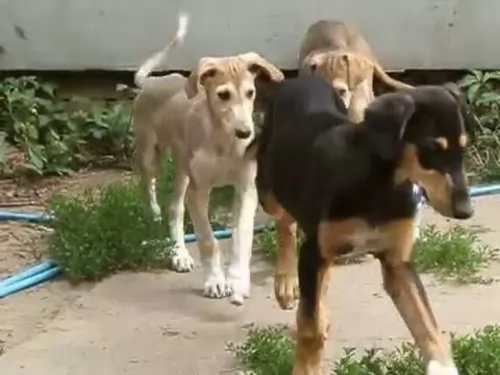 The Chart Polski can live to be 10 – 12 years when he gets his full quota of care in terms of good diet, exercise, love and care and a nice dry, warm place to sleep.
The Chart Polski can live to be 10 – 12 years when he gets his full quota of care in terms of good diet, exercise, love and care and a nice dry, warm place to sleep.
He isn’t known to have any specific health issues that could shorten his life, but by knowing about some of the common dog ailments there are, you can watch your pet and even prevent some risks.
People often think that bad teeth can’t do much harm, but tartar build-up can progress to gum disease, to the roots of the teeth and to damaging other parts of the body such as kidney-, liver- and heart.
Bacterial and viral infections are a threat to any dog, and rabies and parvo for instance can take your pet’s life. Remember that terrible diseases such as these can be prevented through having your dog vaccinated.
Dogs are open to getting all kinds of parasites inside- as well as outside on the skin. Hookworm, roundworm, fleas and ticks are examples of these parasites that can get into your pet’s system through dirty food,water and bites from mosquitoes. Some of these parasites can even be transmitted to you.
If your pet is in any way run down, get him to a vet immediately as there is an effective treatment.
Because this is a rare breed having lived in isolation for centuries, little is known or documented about their health issues. However being a large Molosser, they face some of the same health challenges as all large dogs. These include
• Bloat – when the internal organs of the intestinal system are knotted or inverted. Without immediate attention it causes death under all circumstances. You need to get the dog to a vet as soon as possible.
• Hip Dysplasia – Can cause lameness in hind legs and/or arthritis. Can be treated.
• Elbow Dysplasia – Can cause lameness in the front legs and/or arthritis. Can be treated.
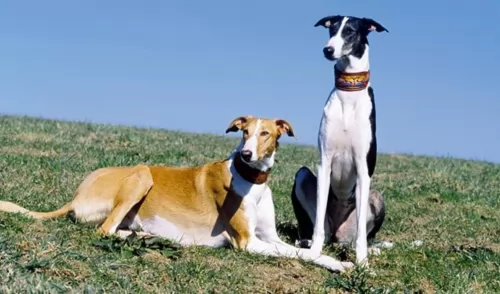 The Chart Polski was bred as a hunting dog and to run at top speed to bring down its prey. Today, he is tall and lean and still loves to run, and will therefore require a good deal of exercise.
The Chart Polski was bred as a hunting dog and to run at top speed to bring down its prey. Today, he is tall and lean and still loves to run, and will therefore require a good deal of exercise.
Don’t let his slender build deceive you because he is powerful and will need a walk every day and be given the opportunity to run. He will happily accompany you when you go running or cycling. Left un-exercised, he will become frustrated and aggressive and even destructive, so as a responsible dog owner, it is up to you to ensure he is well exercised.
The Chart Polski is a large breed puppy and they tend to grow fast at first. You want to make sure that he doesn’t put on weight too quickly as this puts them at risk for skeletal development problems later on such as hip- and elbow dysplasia. Speak to your veterinarian about feeding your puppy correctly so that he grows slowly, allowing his bones and joints to develop strongly and healthily.
Your adult Chart Polski will also need a special diet that caters for his size and energy levels. Remember to include some raw meat into his diet occasionally as well, as this will help him steer clear of dry, allergic skin conditions. Always ensure that he has access to fresh, cool water.
As a hunting dog, you’ll find the Chart Polski to require little grooming. No trimming or stripping is required for his short coat and you’ll simply need to brush him down twice a week.
1Feeding the puppy – due to the risk of bloat, don’t overfeed and don’t feed large meals before or after exercise. Also don’t feed too high protein since the puppies grow so fast and it can cause bone injuries. Feed 3-4 x day.
2.Feeding the adult - due to the risk of bloat, don’t overfeed and don’t feed large meals before or after exercise. feed 2 X day
4. Games and Exercises Although large dogs they are surprisingly good at agility, they need a lot of exercise and long walks.